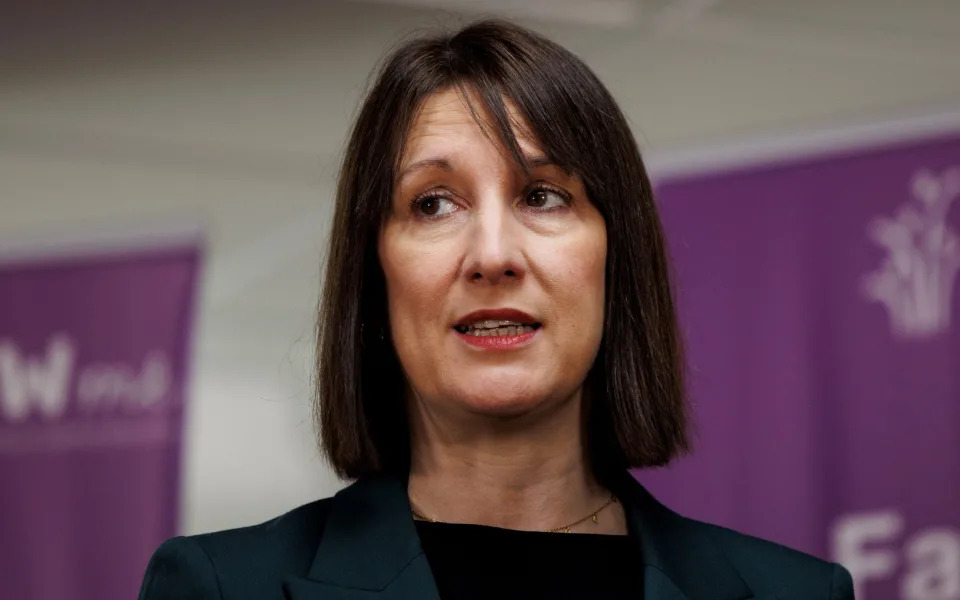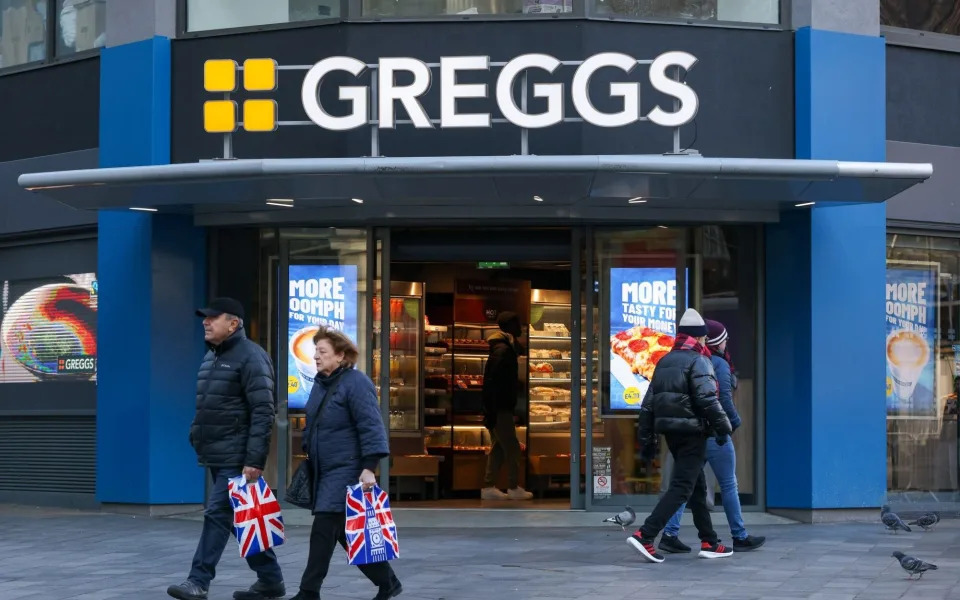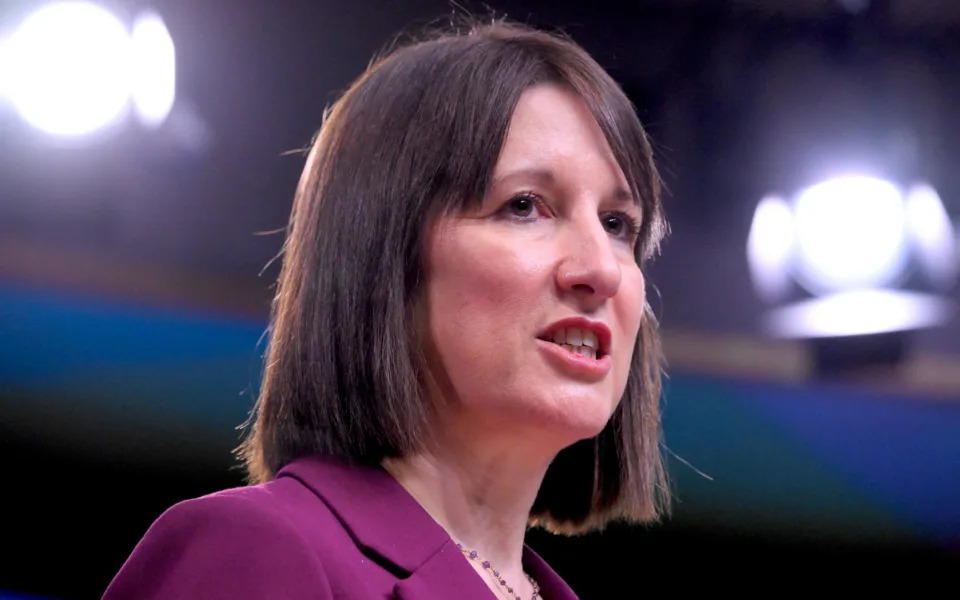
The Treasury has been forced to intervene to stabilise financial markets amid growing concern over the impact of Rachel Reeves’s Budget and a surge in borrowing costs.
In the first such statement since the mini-Budget crisis of 2022, the Treasury attempted to dismiss as “pure speculation” suggestions that rising debt costs had wiped out all of Ms Reeves’s headroom and put her in breach of her own fiscal rules.
The Chancellor has vowed to borrow only to invest, not to cover day to day spending, in the coming years. At the time of the Budget, she was on track to meet this target with £9.9bn of headroom to spare - but higher debt costs mean economists now fear it will be missed.
Ms Reeves signalled that she was ready to slash public spending to maintain “an iron grip on the public finances”. However, there is also growing speculation that she will be forced to raise taxes again this year.
The intervention - a rare comment on market movements - came after the pound dropped as much as 1.2pc against the dollar to $1.233, its lowest since April.
Meanwhile, the yield on 10-year UK gilts - a benchmark measure of the cost of Government borrowing - climbed to its highest level since the global financial crisis in 2008, jumping about 0.1 percentage points to 4.81pc. The Government’s 30-year borrowing costs hit their highest level since 1998.
British debt costs are now 1.4 percentage points higher than those of Greece, the worst victim of the eurozone crisis 15 years ago.
The surge will pile pressure on ministers to reduce borrowing through tax rises or spending cuts.
It also risks fuelling fears that investors believe the economy is trapped in a damaging cycle of no growth and rising inflation, with high taxes deterring business investment.
A Treasury spokesman said: “No one should be under any doubt that meeting the fiscal rules is non-negotiable and the Government will have an iron grip on the public finances.
“UK debt is the second lowest in the G7 and only the [Office for Budget Responsibility’s] forecast can accurately predict how much headroom the government has - anything else is pure speculation.
“Kick-starting economic growth is the number one mission of this Government as we deliver on our Plan for Change.
“Over the coming weeks and months, the Chancellor will leave no stone unturned in her determination to deliver economic growth and fight for working people.”
Andrew Griffith, shadow business secretary, branded the Treasury intervention “extraordinary”.
He said: “The Treasury would normally stick pins under their nails rather than make any public comment. So it shows a degree of real concern. In my experience it is exceptionally rare for the Treasury in this way to make that sort of comment.
“It is a classic of its genre, which is all it does is publicise the fact that the markets are right to be concerned.”
It comes in the wake of Ms Reeves’s record-breaking £40bn tax-raising Budget in October, which included a £25bn increase in National Insurance Contributions paid by employers on their workers’ wages that has damaged confidence.
The raid was accompanied by a planned spending spree, including higher wages for a raft of public sector workers.
Interest costs are rising in part because of fears that the scale of proposed spending will dwarf even the historic increase in tax, meaning the Government will have to fund its plans with higher borrowing on top of its existing £2.8 trillion debt pile.
Global factors are also playing a role, with borrowing costs also up in other major economies owing to fears that inflation will be higher across the West.
Senior Tories hit out at Ms Reeves’s management of the economy, saying she had endangered the country’s stability.
Mel Stride, the shadow chancellor, said: “We should be building a more resilient economy, not raising taxes to pay for fiscal incompetence. Labour’s decision to allow debt to continue rising ever higher leaves us vulnerable even to small changes in markets.”
Andrew Griffith, shadow business secretary, said: “Tragically, the gilt markets can see that the government’s growth plan is dead on arrival.
“The Chancellor is so out of her depth she’ll need a decompression chamber.
“Keir Starmer now needs to grip the situation urgently.”
Sir Keir’s spokesman sought to suggest the rise in borrowing costs was not caused by Government spending plans, saying: “There’s always a range of global factors which drives market movements.
“We will always put economic stability and sound public finances first.”
Meanwhile, Whitehall sources said they did not recognise suggestions that the Treasury statement was unusual.
The Chancellor will head to China for meetings on Saturday, before joining international executives at the World Economic Forum in Davos in two weeks’ time.
Sources said she will wait until later in the month to address the disruption in markets more fully, with a speech setting out the Government’s long-term plans to boost economic growth.
Increasing GDP is one of Sir Keir Starmer’s key missions, although the Prime Minister has already backed away from a manifesto pledge to deliver the fastest growth in the G7.
The Office for Budget Responsibility (OBR) will next assess the public finances in March, as well as Ms Reeves’s chances of hitting her borrowing targets.
If it judges that she is likely to miss those targets - which the Chancellor set herself in October - then she will be expected to take action to get the finances back on track.
Ms Reeves has repeatedly promised she will not launch another tax raid comparable to last year’s Budget.
In November, she told an audience of business leaders in November that she is “not coming back with more borrowing or more taxes”. Days later Ms Reeves appeared to water down this commitment, saying only that she would “never have to repeat a Budget like that” again in a pledge that potentially leaves space for increases on a smaller scale.
The Treasury has also pledged it will not change borrowing rules again, which indicates that spending cuts are the only remaining option if significant action is needed.
Ruth Gregory of Capital Economics said Ms Reeves is now on track to break her fiscal rule by nearly £1bn.
This is because the rise in government borrowing costs and market interest rate expectations since the Budget will drive up the cost of the government’s debt interest bill so much that it has more than wiped out her fiscal headroom – the margin by which she can meet her borrowing targets. At the time of the October Budget, the OBR estimated this wriggle room at £9.9bn.
Sanjay Raja, economist at Deutsche Bank, said higher rates in financial markets will push up the Government’s interest costs by £10bn per year.
The economy ground to a halt in the three months to September and went into reverse in October, while surveys of businesses show a rising share slashed jobs at the end of the year in anticipation of rising taxes, raising fears Britain is at growing risk of recession.
Mr Raja said: “GDP growth will likely be revised lower from its optimistic 2pc projection for the current calendar year. Inflation too will almost certainly be revised higher – adding to debt costs. And the OBR’s unemployment projections will also likely rise further than previously anticipated, given recent survey data.”
It means “spending cuts, more borrowing, and likely a little more taxation to close the emerging fiscal hole. Indeed, the forthcoming Spring Statement, Spending Review, and Autumn Budget will likely be painful sequels to the Chancellor’s historic inaugural budget”.
Read the latest updates below.
07:34 PM GMT
Signing off...
That’s all for today on this blog.
Thanks for joining us as we’ve covered the latest on the UK economy. You can follow all our latest economics and business stories here .
06:51 PM GMT
Bank of England should cut rates in February, urges economist
Businesses need an interest rate cut as a result of rising gilt yields, an economist has said.
Prof Costas Milas, of the University of Liverpool, told The Telegraph: “Current movements in the 10-year government yield are a big problem also for the Bank of England: the yield sets the tone for borrowing costs of all firms in the UK.
“What we experience now are much tighter monetary conditions than only a month ago when the Bank of England kept interest rates on hold.”
He added: “In my view, the Bank of England has to lower the Bank Rate in early February.”
Money markets are almost pricing in two quarter of a percentage point cut in interest rates this year, with a 69pc chance of a cut in February.
05:59 PM GMT
Investors worried UK will be hit with stagflation, says Schroders
Investors are worried that Britain is facing the pain of stagflation, one of the City investment manager Schroders has said.
Marcus Jennings, fixed income strategist at Schroders, told Bloomberg: “You are getting that negative feedback loop in the UK whereby higher yields means higher borrowing and therefore feeding greater fiscal concerns. That’s quite specific to the UK.
“Investors are concerned about a stagflationary environment.”
The UK suffered stagflation, a state which combines economic stagnation and high inflation, in the Sixties and Seventies as a result of poor post-war government policy.
The term was coined by Tory frontbencher Iain Macleod during Harold Wilson’s Labour administration.
Mr Macleod told the House of Commons in Nov 1965: “We now have the worst of both worlds - not just inflation on the one side or stagnation on the other, but both of them together. We have a sort of ‘stagflation’ situation. And history, in modern terms, is indeed being made.”
05:48 PM GMT
Investors question how UK will escape doom loop, says fund manager
The market is questioning how Rachel Reeves will react to the worsening economic picture, a City investment manager has said.
Ben Nicholl, a senior fund manager at Royal London Asset Management, told the FT: “The Chancellor has no room left against her fiscal rules given the upward move in yields, and the market is questioning what the next move is from here.
“Raising taxes or cutting back on departmental spending will only put further downward pressure on growth, which in turn puts pressure on tax revenues when borrowing is already high.”
05:24 PM GMT
British midcap index slumps as cost of government borrowing surges
Nationally-focused British stocks were slammed on Wednesday alongside sterling, while benchmark UK gilt yields soared as investors grappled with the prospects of higher interest rates and stubborn inflation.
The domestically-focused FTSE 250 mid-cap index fell by 2pc to an eight-month low.
The blue-chip FTSE 100 was broadly flat, cushioned by a 1pc drop in sterling that helped international firms on the index that draw a major portion of their revenues overseas.
A sell-off in some of the world’s biggest government bond markets appeared more pronounced in UK gilts, fanning worries about the impact of higher borrowing costs on the British Government’s already shaky finances.
Thirty-year gilt yields hit their highest since 1998 at 5.383pc, while 10-year yields rose as high as 4.821pc to levels last seen in 2008.
Laith Khalaf, head of investment analysis at AJ Bell, said: “It’s somewhat odd that bond yields have risen to new highs so long after interest rates have peaked, which suggests markets were complacent about inflation and overly confident that the Bank of England would cut rates sharply.”
Gilt yields have risen in recent weeks as most investors now expect the Bank of England to cut rates by only about half a percentage point this year, while inflation looks likely to hover above the central bank’s 2pc target.
04:52 PM GMT
Pound falls as markets fear ‘perilous UK fiscal outlook’
Sterling slid for a second day on Wednesday against a generally firmer US dollar, despite British long-term borrowing costs sitting at around their highest since 1998.
Solid US data out today confirmed investors’ view that US interest rates will stay higher for longer, pushing up US Treasury yields and boosting the dollar against most major currencies.
The pound is down 1pc at $1.2353, after sliding 0.34pc on Tuesday.
It was also weaker against the euro, which is up 0.6pc at 83.39p.
That fall came even as yields on British government bonds, known as gilts, spiked higher, rising more than US Treasury yields on Wednesday.
Britain’s long-term government borrowing costs are at their highest since 1998, with 30-year gilt yields at 5.360pc compared to 5.247pc yesterday.
The 10-year yield rose to its highest since Oct 2008, at 4.808pc compared with 4.688pc yesterday.
“This is a global move but it’s being led by the UK,” said RBC fixed income strategist Megum Muhic.
Michael Brown, a strategist at Pepperstone, said: “The way gilts are trading would suggest that participants are becoming increasingly concerned over the perilous UK fiscal outlook.”
So far, higher yields have offered the pound little support against the dominant dollar, with sterling trading at its lowest since April.
Compared to a resilient US economy, where Tuesday’s data showed that job openings unexpectedly rose in November and redundancies were low, Britain’s economy lost momentum in the second half of 2024.
“Stagflation remains the ‘mot du jour’,” said Pepperstone’s Brown.
04:14 PM GMT
FTSE 250 slumps to an eight-month low
Increasing worries about the UK economy has hurt the FTSE 250 today, with the index slumping to its lowest level in eight months. The FTSE 250, made up of “mid-cap” companies such as Greggs and book publisher Bloomsbury, fell 1.7pc.
Chris Beauchamp, chief market analyst at online trading platform IG, said: “The mood music around the UK continues to deteriorate as 30-year gilt yields rise to their highest level over a quarter of a century.
“Investors have come back from the festive break in a sour mood concerning the UK, and have now decided that the UK’s cheap status is not an attraction, but instead a reflection of the poor situation facing the British economy.
“The cautious attitude is evident across markets, but it seems to be the UK that is bearing the brunt.”

03:57 PM GMT
Reeves’s Budget maths never added up, says City analyst
The maths behind October’s Budget never added up and Britain faces a “fiscal tightening”, a leading City analyst has warned.
Jordan Rochester, head of macro strategy at Japanese banking giant Mizuho, told Bloomberg: “The October Budget relied on optimistic growth projections and assumed lower refinancing costs.
“The maths didn’t really add up at the time to cynics like myself and it certainly doesn’t any longer with the fixed income sell-off likely to force the Chancellor to have to reign in spending or raise taxes again to meet her new fiscal rules. The Spring update will likely be a fiscal tightening - making the optimism from the OBR and BOE forecast update post budget look quite wrong indeed...
“‘Bond vigilante’ was one of our tail risks for the year in our outlook. I just hope it doesn’t become the word of the year.”
03:44 PM GMT
Rachel Reeves ‘raising taxes to pay for fiscal incompetence’
The rise in government borrowing costs poses a challenge for Rachel Reeves, the Chancellor, but the Government today attempted to point the finger at the Tories.
The Prime Minister’s official spokesman said: “I’m obviously not going to get ahead ... it’s up to the OBR (Office for Budget Responsibility) to make their forecasts and they’ll make their forecasts at the spring statement in the usual way.
“But I would say when the Government came into office we made very clear why it’s so important to manage the public finances to deal with the £22bn black hole that was in the public finances because having stability in the public finances is precursor to having economic stability and economic growth.”
Mel Stride, the shadow chancellor, claimed that Ms Reeves’s significant spending and borrowing plans from the Budget are “making it more expensive for the government to borrow”.
“We should be building a more resilient economy, not raising taxes to pay for fiscal incompetence,” he said in a post on X.
“Labour’s decision to allow debt to continue rising ever higher leaves us vulnerable even to small changes in markets.”
Michiel Tukker, senior European rates strategist at ING, said: “Myriad factors contributed to the stretch higher, including Labour’s spending ambitions, sticky inflation, higher US rates and supply pressures.
“We still see gilt yields settling lower later in the year, but as long as these factors linger, a change in direction may take some time.”
03:31 PM GMT
UK is ‘looking like an outlier’ as markets knock the pound
The UK is “looking like an outlier [in the bond market] and is in the sights of the bond vigilantes”, a broker has said on the day the pound was the worst performing currency among the G10 group of industrialised nations.
Kathleen Brooks, research director at XTB, said: “The UK currently has a lower budget deficit than the US and France at 4.7pc of GDP, versus 6.24pc deficit for the US, and a 5.5pc deficit for France.
“However, the deficit is set to rise this year and the Government is set to issue more debt in 2025 versus 2025. With growth expected to moderate, this will weigh on the deficit.
“Other countries have their fiscal issues, but the UK is potentially on the cusp of another fiscal crisis, without either intervention from the Bank of England or government action to either raise tax or cut spending. Neither of these are attractive options when the economy is stagnating.”
The term “bond vigilantes” refers to big investors who sell sell bonds in reaction to government policies they view as irresponsible. The sale of bonds increases the yield, thereby increasing government borrowing costs.
03:22 PM GMT
Readers comment on Britain’s ‘doomsday loop of decline’
Readers in the comments section are discussing the surge in Government borrowing in the wake of Rachel Reeves’s “utter disaster” of a Budget.
Join the conversation here .
03:13 PM GMT
Mortgage borrowers face rising rates amid bond yield sell-off
The surge in government borrowing costs is poised to deliver a blow to mortgage holders after a rise in the key rate used to price deals.
Five-year swap rates – the main pricing mechanism for fixed rate mortgages – rose to as high as 4.26pc, which is the steepest point since May.
Rates have pushed higher as traders have reduced bets on the Bank of England cutting interest rates this year.
Money markets indicate that policymakers will lower borrowing costs just twice by the end of the year, with a second cut coming as late as December.
Matthew Ryan of financial services firm Ebury said: “While the speed and extent of the move higher in bond yields has not been anywhere near as violent as that witnessed following the Truss budget in 2022, the impact of higher rates on the economy, particularly via higher mortgage rates, is not to be underestimated.”
I hope today’s coverage has been helpful so far. At this point, I will hand you over to my colleague Alex Singleton .
02:53 PM GMT
Borrowing costs to stay high for ‘some time’
Rachel Reeves will be forced to contend with higher borrowing costs for “some time” as Britain contends with higher inflation and her £70bn Budget spending plans, according to economists.
Long-term borrowing costs have reached their highest level since 1998, while the benchmark 10-year gilt yield jumped as much as 14 basis points to 4.82pc, the steepest point since August 2008.
Michiel Tukker of Dutch bank ING said that in the long term the rate of borrowing “should be lower” but warned that “changing direction may need time”.
Although there has been a sell-off in the pound, “further weakness should be limited – since this is not a sovereign crisis”, he said.
“Myriad factors contributed to the stretch higher [in borrowing costs], including Labour’s spending ambitions, sticky inflation, higher US rates and supply pressures,” he said.
“We still see gilt yields settling lower later in the year, but as long as these factors linger, a change in direction may take some time.”
02:35 PM GMT
Financial stocks hit by rise in borrowing costs
Financial stocks have slumped on UK markets as they came under pressure from rising bond yields.
St James’s Place slumped 6pc to become the worst performer on the FTSE 100 in response to rising borrowing costs.
Investment managers Legal & General and M&G were down 4pc and 3.3pc, respectively, while banks like Lloyds dropped by 3.8pc.
London’s domestically-focused FTSE 250 index was down 1.7pc, its largest decline since August.
02:20 PM GMT
Treasury’s debt interest costs £10bn higher after bond market sell-off
The Treasury’s debt interest bill is likely to be about £10bn a year higher than official forecasts after the sell-off on bond markets, according to economists.
Deutsche Bank said the rise in gilt yields mean the “razor thin headroom left in the Autumn Budget has likely all evaporated”.
Senior economist Sanjay Raja said that based on current market expectations, the Government’s net interest costs would be about £10bn more per year by the end of this parliament in 2029/30, compared to the forecasts in the Budget in October.
He added that the situation has been made worse by Britain’s weaker than expected growth, after the gross domestic product (GDP) was downgraded from 0.1pc to 0pc for the third quarter and declined by 0.1pc in October.
He said: “GDP growth will likely be revised lower from its optimistic 2pc projection for the current calendar year. Inflation too will almost certainly be revised higher – adding to debt costs.
“And the OBR’s unemployment projections will also likely rise further than previously anticipated, given recent survey data.
“What does this mean for the fiscal outlook? Spending cuts, more borrowing, and likely a little more taxation to close the emerging fiscal hole.
“Indeed, the forthcoming Spring Statement, Spending Review, and Autumn Budget will likely be painful sequels to the Chancellor’s historic inaugural budget.”
01:52 PM GMT
Surging borrowing costs leaves Britain facing tax rises, warn bond traders
Britain is at greater risk of tax rises following the surge in government borrowing costs, one of the UK’s largest bond traders has warned.
Peder Beck-Friis of Pimco said “the chances of spending cuts or tax increases will increase” if Rachel Reeves wants to keep to her fiscal rules despite rising bond yields.
Government borrowing costs have surged since doubts about Rachel Reeves’s Budget plans first emerged.
Gilt yields have increased in recent weeks and the 10-year yield is now up around 100bps since mid-September to 4.81pc, its highest since 2008.
While Mr Beck-Friis partially blamed the Chancellor’s Budget spending plans for the rise in yields, he cautioned that some other factors are also at play.
He said: “Although UK-specific factors, such as the Budget, have contributed to the rise, most of the increase has been driven by rises in US Treasury yields during the same period.
“Both weaker growth and higher interest rates put pressure on public finances.
“Unlike most other large developed countries, the UK borrows money at a much higher interest rate than its underlying economic growth rate, which worsens debt dynamics.
“If the current trends of rising yields and slowing growth persist, the chances of spending cuts or tax increases will increase for the government to adhere to its new fiscal rules.”

01:37 PM GMT
Stocks fall as Trump ‘considers declaring national economic emergency’
Global stock markets have fallen after reports that Donald Trump was mulling a declaration of a national economic emergency when he takes office later this month.
The FTSE 100 was down 0.5pc and the FTSE 250 dropped 1.7pc while Wall Street was lower in premarket trading as the president-elect prepares to build his new tariff program by using the International Economic Emergency Powers Act, according to CNN.
It would authorise Mr Trump to manage imports during a national emergency.
Stocks have also been hit by the rise in Treasury bond yields, with that on the benchmark 10-year yield rising to 4.7pc - its highest in eight months.
However losses were limited by the latest ADP National Employment Report for December, which showed the US private sector added 122,000 jobs, compared to estimates of 140,000. This has boosted the case for Federal Reserve interest rate cuts.
01:03 PM GMT
UK borrowing costs rise at fastest pace among major economies
The yield on UK government bonds, known as gilts, has spiked at a faster pace than any other major world economy as traders worry about the “perilous” outlook for the public finances.
Britain’s long-term government borrowing costs are at their highest since 1998, with 30-year gilt yields last up nearly 10 basis points (bps) on the day at 5.34pc.
The 10-year yield was also up nine bps to 4.78pc, which is its highest level since the global financial crisis in 2008.
By contrast US 10-year Treasury yields rose three bps to 4.71pc, with long-term bond coupons up four bps to 4.96pc.
Michael Brown, strategist at Pepperstone, said: “The way gilts are trading would suggest that participants are becoming increasingly concerned over the perilous UK fiscal outlook.”
Investors expect the Bank of England to cut interest rates by only about half a percentage point this year, with inflation likely to hover above the central bank’s 2pc target.
12:49 PM GMT
Pound drops as US economy strengthens
The pound has fallen for a second day after figures showing the American economy remains healthy.
Sterling was last down 1.1pc to $1.234 after sliding 0.3pc on Tuesday as solid US data on services activity and job vacancies confirmed the view that US interest rates will stay higher for longer.
This has pushed up bond yields and boosted the dollar against most major currencies.
Michael Pfister of Commerzbank said: “Political risks aside, there is little reason to be bearish on the US dollar - even if current levels look a little overdone.”
12:28 PM GMT
Pound raises ‘red flag’ amid surging borrowing costs
Economists have warned that the drop in the pound amid surging borrowing costs is an “ominous” signal for the currency:
12:14 PM GMT
Pound plunges as borrowing costs surge
The value of the pound plunged to a nine-month low amid a surge in government borrowing costs that has left Rachel Reeves on the verge of breaking her own fiscal rules.
Sterling dropped as much as 1.2pc against the dollar to $1.233, its lowest since April, amid a sharp sell-off in bond markets.
The yield on the 10-year UK gilt - a benchmark measure of the cost of government borrowing - has climbed to its highest level since the global financial crisis in 2008. It has jumped about 10 basis points today to 5.34pc.
The cost of long-term government borrowing has also risen further after hitting its highest level since 1998 on Tuesday.
Analysts suggest markets are waking up to the challenge faced by the Chancellor to meet her spending plans through higher government borrowing:
11:56 AM GMT
Budget spending blitz could prove ‘badly judged policy choice’
The Chancellor’s decision to announce near record spending plans in the Budget funded by more borrowing could prove a “badly judged policy choice”, according to economists.
Kallum Pickering, chief economist at Peel Hunt, said the rise in bond yields - a measure of the cost of government borrowing - since December “presents a risk to already fragile global economic momentum and poses challenges for risk markets and policymakers”.
The Chancellor risks missing her self-imposed fiscal rules, he warned, as the cost of borrowing hits fresh highs on debt-markets.
He said: “Rising bond yields in the UK could begin to crowd out private sector economic activity.
“While the Government’s plans for a (partly) debt-financed fiscal expansion should support growth momentum over the medium term, if the resulting rise in bond yields reduces private economic activity, it could turn out to be a badly judged policy choice.
“In addition, rising bond yields push up government borrowing costs and pose a problem for Chancellor Rachel Reeves’ ability to meet her self-imposed fiscal rules – which include hitting a current budget (excluding public investment) surplus by 2029/30.
“If bond yields rise further, Reeves may be forced to make the economically damaging decision of further increasing taxes or cutting back on planned public spending to balance the books.”
11:42 AM GMT
Pressure on Reeves rises after fresh surge in borrowing costs
Rachel Reeves may have to make “economically damaging decisions” to raise taxes or cut spending as the cost of government borrowing surges on bond markets.
The Chancellor faces increasing pressure on the public finances as debt costs hit fresh highs today.
It comes after the UK Debt Management Office (DMO) auctioned £4.25bn of new debt this morning, a day after long-term government borrowing costs surged to the highest level since 1998.
The debt market has hit a series of other unwelcome milestones for the Treasury today, with the yield on the benchmark 10-year gilt rising to its highest level since the global financial crisis in 2008.
The yield on inflation-linked 30-year gilts has risen to 2pc for the first time since the sell-off in the wake of the mini-Budget in 2022.
Economists have warned that the Chancellor is on the brink of breaking her fiscal rules and being forced into another tax raid as bond yields rise.
Kallum Pickering, chief economist at Peel Hunt, said: “If bond yields rise further, Reeves may be forced to make the economically damaging decision of further increasing taxes or cutting back on planned public spending to balance the books.”
11:28 AM GMT
Inflation-linked borrowing costs hit highest level since Truss meltdown
The cost of a portion of government borrowing has risen to its highest level since the bond market turmoil that brought down Liz Truss’s government.
The yield on inflation-linked 30-year gilts has risen to 2pc for the first time since the sell-off in the wake of the mini-Budget in 2022.
The yields on gilts - the return the government promises to buyers of its debt - have risen across the board today, with the 30-year coupon jumping eight basis points today to 5.33pc.
11:09 AM GMT
UK bond yield hits one-year high
Another worrying sign from the debt market for the Chancellor, as the yield on the Treasury’s benchmark bond hits its highest level since October 2023.
The 10-year UK gilt yield - a measure of the cost of government borrowing - has risen three basis points today to 4.71pc.
It has risen by 15 basis points over the last week as investors expect interest rates to stay higher for longer.
10:51 AM GMT
Borrowing costs edge higher after auction
Government borrowing costs have increased today after a sell-off on Tuesday as investors expect fewer interest rate cuts this year.
The yield on 10-year UK gilts was last up one basis point to 4.69pc while the five-year yield was up to 4.46pc.
The rise in government borrowing costs follows the biggest auction of five-year UK gilts in more than a decade.
On the stock markets, the FTSE 100 was up 0.2pc after a 0.1pc fall on Tuesday, although the FTSE 250 was down 0.5pc following a 1.3pc drop the day before.
Meanwhile, the 10-year US Treasury bond yield was little changed at 4.68pc.
Wall Street stocks were higher in premarket trading a day after the S&P 500 and Nasdaq Composite both fell more than 1pc.
It comes after data from the US showed employers advertised more job vacancies at the end of November while activity among services businesses grew faster than expected in December.
The indication of a healthy American economy led traders to reduce bets on interest rate cuts this year, pricing in just one reduction by the Federal Reserve this year.
This pushed down stock prices and boosted bond yields. Bond yields move inversely to prices.
Mohit Kumar, an economist at Jefferies, said he expects this week’s sell-off in bond markets “should not have many legs and see rates as close to their local peaks at current levels”.
10:21 AM GMT
Gilt auction attracts higher demand
The latest bond auction by the DMO attracted three times the number of bids than the amount of debt that was available.
It means the sale was slightly more oversubscribed than the last five-year gilt auction.
Traders were keen to see how big demand would be for the bonds, which mature in 2030.
Low levels of demand would have risked a further rise in yields - an indicator of government borrowing costs - in an effort to attract investors.
The sale of £2.25bn of 30-year gilts on Tuesday had attracted the lowest level of demand in more than a year.
10:10 AM GMT
Treasury auctions £4.25bn of new debt
The Treasury has sold another £4.25bn of five year bonds a day after the government’s long-term borrowing costs surged to their highest level since 1998.
The five-year gilts were sold with a yield of 4.49pc - the return the Treasury promises to buyers of its debt.
On the secondary bond market, investors were trading the five-year gilts with a yield of 4.45pc.
09:44 AM GMT
Borrowing costs edge lower ahead of bond auction
Bond yields have edged lower in early trading ahead of the latest auction of government debt.
The 10-year UK gilt yield - an indicator of government borrowing costs - was down nearly two basis points to 4.66pc.
The 30-year gilt yield, which it hits highest level since 1998 on Tuesday, has fallen one basis point to 5.23pc.
Five-year yields were sligtly lower on the day at 4.43pc.
09:44 AM GMT
Treasury holds biggest five-year bond sale in a decade as borrowing costs surge
The Treasury will hold its biggest sale of five-year bonds in more than a decade as Rachel Reeves faces increasing pressure from rising borrowing costs.
The UK Debt Management Office (DMO) will auction £4.25bn of new debt later this morning a day after long-term government borrowing costs surged to the highest level since 1998.
Traders will wait to see how big demand is for the bonds. Low levels of demand could trigger a further rise in yields - an indicator of government borrowing costs - in an effort to attract investors.
Five-year gilt yields have risen almost 35 basis points since the beginning of last month to around 4.44pc, while 30-year yields are the highest in more than a quarter of a century.
Economists have warned that the Chancellor is on the brink of breaking her fiscal rules and being forced into another tax raid as bond yields rise.
Capital Economics said that the jump in borrowing costs had wiped out £8.9bn of the Chancellor’s £9.9bn headroom to meet her fiscal rule of a balanced budget by 2029/30.
Economists Ruth Gregory and Alex Kerr said: “There is a significant chance that the Office for Budget Responsibility (OBR) will judge that the Chancellor, Rachel Reeves, is on course to miss her main fiscal rule when it revises its forecasts on March 26.”
09:39 AM GMT
Good morning
Thanks for joining me. Investors are bracing for the biggest auction of five-year government bonds in a decade amid a surge in yields that has pushed the cost of government borrowing higher.
The auction of £4.25bn of new debt comes as the Chancellor was warned by economists that she is on the brink of breaking her fiscal rules and being forced into another tax raid as bond yields rise.
5 things to start your day
-
Chinese fast fashion giant ‘horrifies’ MPs in row over workers’ rights | Criticism will deal a blow to retailer’s hopes of £50bn listing on the London Stock Exchange
-
Plunging birth rate makes London UK’s fastest-ageing city | Median age in capital rises to 35.8 but has fallen to 34.5 in other large urban centres
-
Why bond vigilantes have made another Labour tax raid almost inevitable | Rising gilt yields and shrinking fiscal headroom mean Rachel Reeves may be forced to change her plans
-
America’s biggest bank quits Mark Carney’s net zero group | JP Morgan joins the exodus from Net Zero Banking Alliance amid a US backlash against green finance
-
North Sea gas production to plunge after Ed Miliband crackdown | Britain’s fossil fuel output will shrink at double the rate predicted in 2022
What happened overnight and so far today
Stocks wavered after a sell-off on Tuesday on Wall Street, which was sparked by data indicating the US economy and jobs market remained robust, further denting hopes for interest rate cuts.
The FTSE 100 was flat and the FTSE 250 was down 0.6pc in early trading as figures showing a strong US economy added to inflation worries.
All three main indexes on Wall Street ended in the red on Tuesday, with the Nasdaq and S&P 500 shedding more than one percent each.
Tech firms, which had led a surge the previous day, were again the key drivers of action, with chip titan Nvidia tanking after a disappointing product presentation.
A closely watched survey of the crucial US services sector saw a pick-up in December, with the prices component soaring far more than expected to hit the highest level since last January.
Asian markets were mixed overnight. Tokyo, Hong Kong, Taipei, Manila, Mumbai and Jakarta all fell, though Sydney, Singapore, Seoul, Wellington and Bangkok rose. Shanghai barely moved.
Broaden your horizons with award-winning British journalism. Try The Telegraph free for 1 month with unlimited access to our award-winning website, exclusive app, money-saving offers and more.






